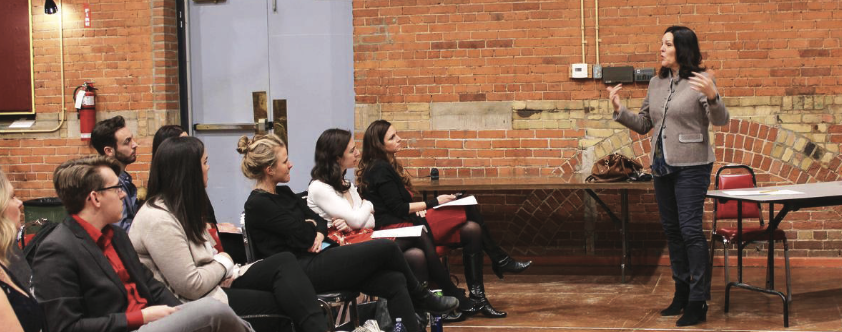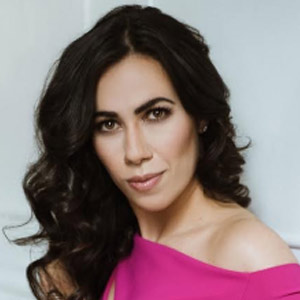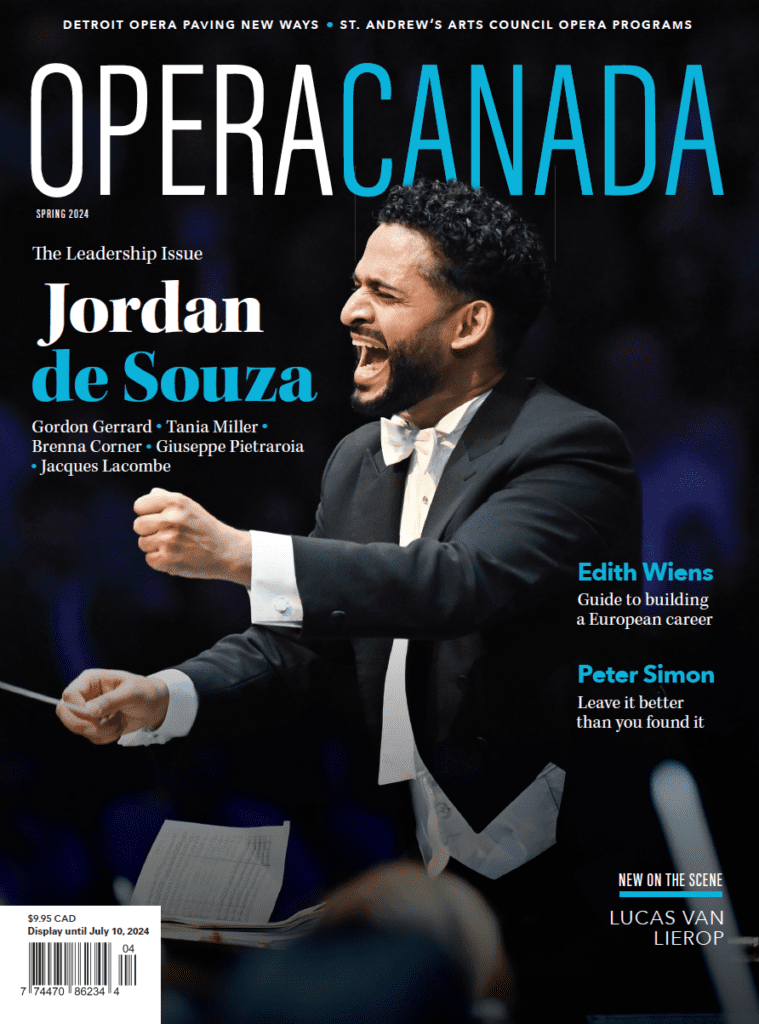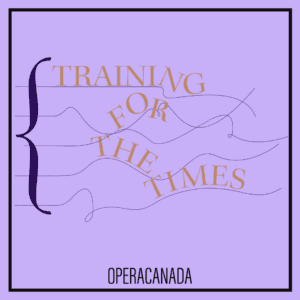 There’s no shortage of young classical artists at Canada’s conservatories and music schools, but how well prepared are they for the realities of a singing career. Lucia Cesaroni finds some support for a rethink of the status quo
There’s no shortage of young classical artists at Canada’s conservatories and music schools, but how well prepared are they for the realities of a singing career. Lucia Cesaroni finds some support for a rethink of the status quo
Canadian opera training may need a rinascimento, a second act in which characters come together, untangle the plot and move it forward. The opera industry has changed, but does the current system for training artists fully prepare them for the new realities in the professional trenches? Considering the problem holistically, the system encourages the Perpetual Student Singer, cycling young talent through undergraduate and graduate degrees, summer programs and now multiple Young Artist Programs (YAP). The result is at least 10 years spent learning, but mostly sitting and waiting. Current practice would seem to underplay the new normal, which is that most would-be opera singers need transferrable skills training and more diversity of thought in school and in their apprenticeships to help them develop a portfolio of income streams. Betty Allison, who sang for years at the highest level in Canada, wrote a doctoral dissertation on mid-career artists and their non-musical stressors and coping strategies, and now teaches at Dalhousie University’s Fountain School of the Performing Arts, is one proponent of change. “I never felt like I fit, and I kept looking for the answer,” she says. “The answer wasn’t more education. It’s still serving a model of the past, something that’s dying. The answer is being honest with [students] about what they will face and fostering portfolio careers.”
There are more than four dozen music schools and conservatories in Canada, many in university settings, and there is no shortage of students applying to them. Enrollment in the University of Toronto’s undergraduate voice program has more than doubled since the aughts, while Montreal’s Opera McGill went from about 30 students, mostly undergraduates, 15 years ago to 64 in 2021. The current number of undergraduate and graduate voice students in Canada is not easy to pin down, but even with a likely drop in admissions due to the pandemic, there are enough to fuel an annual graduation rate of hundreds of aspiring singers.
The Canadian opera world, however, cannot fully employ them. The Association for Opera in Canada’s database counts 12 large companies and several smaller, indie producers in Canada. Opera Canada’s 2021 annual survey of the industry counted 45 opera producers registered as not-for-profits with Revenue Canada, but the top 10 companies, which includes almost all of those who can pay a living wage with budgets for multiple productions, account for 98% of the sector’s economic activity: the Canadian Opera Company alone accounts for 40% of Canada’s opera business in dollar terms.
It’s also time to fly out the velvet curtain to put a spotlight on the real earnings potential in a sector as small and as economically fragile as opera. A leading role at the union-affiliated companies in Canada (not counting the COC) garners $2,500-$4,000 per performance. So, if a singer wins two to four of those contracts a season with two to four or five performances per contract, the most generous math for the small number of professional Canadian singers who are hired for the small number of title roles adds up to $64,000 in fees before taxes, management commission and preparation expenses. Allison sees the situation as performer and professor: “It has to be very clear that we’re not training them for jobs. Not for a second. One percent, maybe, can have some kind of a career.”
There’s more than opera to make a singing career, of course, but even with concert and recital work, it’s still a tough and unpredictable profession. “There are artists whose talent is recognized at a very early age and who go on to a terrific life, but they a very small percentage,” says Henry Ingram, Managing Director of Dean Artists Management, Canada’s biggest agency. “There’s also a whole lot of others who can make a valuable contribution and who should be able to pay their bills.” But, as this current pandemic has shown dramatically, outside pressures can have dramatically adverse effects on the performing arts. “I think it’s true that we’ve never truly rebounded from the financial collapse of 2008,” Ingram adds. “Fees did go down and presenters started to say, ‘Well, maybe we don’t really need to pay all this much,’ and as things turned around economically, they didn’t in turn say, ‘Now we can pay people what we used to’.”
The main issue, though, is how artists prepare to enter the workplace. It used to be that aspiring singers might complete a three-year diploma or four-year degree and then get down to work. Soprano Adrianne Pieczonka, now also Head of the Vocal Department of the Royal Conservatory of Music’s Glenn Gould School, speaks to this model: “I was performing professionally on stage at 25; it’s not for everyone, but it can be done. The problem now is, you do undergraduate and graduate degrees and then a young artist program until your early 30s. I think more risks could be taken with our young artists. They’re often kept in little holding tanks. We could be putting them on [stage] far more. In my 3rd and 4th year of undergrad, I was also in the COC chorus, and I made good money. Now the institutions have really diverged.”
Certainly, for some voices, a case can be made for extra time maturing in a “safe space,” which these days typically means in a YAP. Billed as links between the scholastic and professional worlds, these have proliferated over the past two-to-three decades and today tend to be regarded as extensions of singer education. Much time in YAPs is spent in coachings, lessons and in observing rehearsals, although there are also opportunities to sing small roles in the associated companies’ mainstage productions. Mezzo Charlotte Burrage, a former member of the COC Ensemble Studio, cites her experience: “If you’re lucky, you’re getting 15%-20% of your total hours a season on stage. That’s if you’re cast in more than one show and not just understudying. For covers, you get one run through in a rehearsal hall with piano. You’re not getting stage time with the orchestra… It’s a lot of coaching. I benefited from this for one role, covering Suzuki in Madama Butterfly. I got to watch everything Elizabeth DeShong did, which was inspiring. I was then hired to sing the part at Saskatoon Opera, and I was ready. But I learned way more actually doing it.”
But if you consider YAPs an extension of a singer’s education—as a kind of post graduate stream—how might we align the academic and the vocational that make up the whole system? At any level, studying voice, learning technique and how to employ it is vocation training, but students also take academic courses in music history as well as other electives. Many singers take languages, which is potentially useful to them, but there are fewer opportunities to develop critical thinking or writing, management or other business skills. Courses tend to skew to the liberal arts, though singers aren’t getting a liberal arts degree. They are trained in a semi-vocational school inside the university, and often end up with the patina of an academic credential in a BMus or MMus. “I do think that we are here to nurture artistry,” says Patrick Hansen, Associate Professor and Director of Opera Mcgill in the university’s Schulich School of Music, “But there’s a sense that the curricular activities of learning solfege, music history and so on are trying to compete with math and physics, which teach theoretical things. And so, to make us look like what we do is academic, we’ve created a false curriculum reality.”
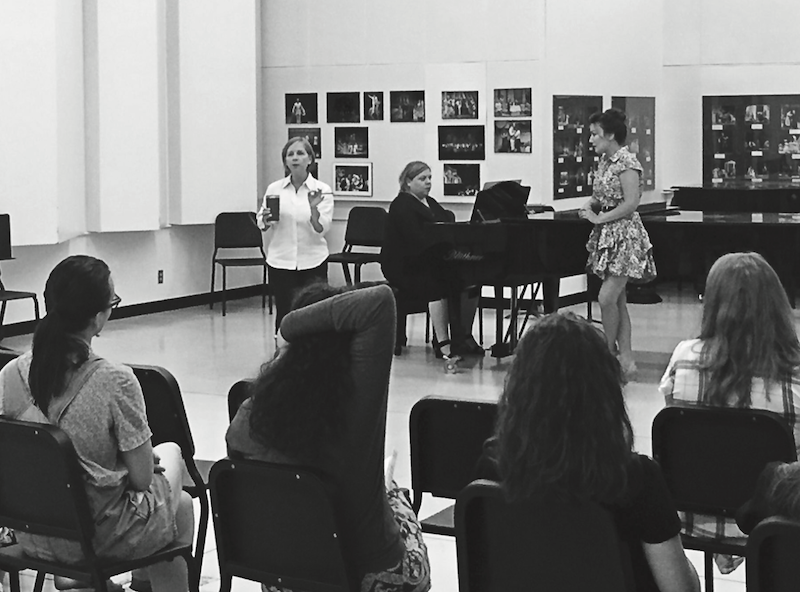
Sandra Horst teaching at a University of Toronto and Against the Grain Theatre 2019 summer programme Ⓒ COURTESY UNIVERSITY OF TORONTO/AGAINST THE GRAIN THEATRE
Sandra Horst, Director of Musical Studies in the University of Toronto Faculty of Music’s Opera Division, has a practical take on the uneasy alliance between the academic and the vocational in a university setting. “Tuition for a BA is equal to that of a BMus. In a BA, you can go into a classroom ratio of hundreds of students to one professor. The university is making so much money as hundreds pay to take that course. In music, we have a ration of 30 or 4- to 1. And those students also require private lessons with their teachers every week. The Faculty of Music has to pay for that. But the university won’t change our model.”
An academically oriented university education, however, is no longer regarded, as it once was, as the be-all-and-end-all for successful careers. Ken S. Coates, Research Chair in Regional Innovation at the University of Saskatchewan prepared a report, Career Ready, for the Canadian Council of Chief Executives in 2021in which he argues for 30 percent fewer university students than at present. “Given that the vast majority of students attending university do so because of their aspirations for a decent career and income, it is also legitimate to ask if the system is adequately preparing young adults for the contemporary workforce.” Other research suggests that a conventional university degree has lost some of its immediate currency in today’s market. A study at University of Waterloo found that 96% of the graduates of its more practically and vocationally oriented co-op education program found work in their field within six months of graduation, compared to 79 percent of all graduates in Ontario. And 82% of Waterloo co-op graduates were earning $50,000-plus two years after graduation compared to 45% of Ontario graduates.
Some music schools are already exploring programs that open the way to multiple career paths. The Music and Health Science Research Collaboratory at UofT is one example. Answering growing demand from the healthcare sector, music therapy is at the nexus of neuroscience, psychotherapy and high-level, transferable musical skills. Horst is overseeing a pilot double-degree program at the Master’s level in opera and health science that offers an advanced singer the opportunity to prepare for a stage career while also providing for a second, simultaneous career that might cover the inevitable gaps between performing engagements.
There are other examples of interdisciplinary programs that show innovation in music schools, though they are perhaps more to expanding students’ awareness of their work as singers than to developing alternative career alternatives. One funded to the tune of $600,000 over three years at the University of British Columbia brings together its Centre for Brain Health, UBC Opera and the Linguistics department. Nancy Hermiston, Chair of the School of Music’s Opera and Voice Divisions explains: “There is so much going on in our brains while we’re performing and the amount of multi-tasking and learning we do is phenomenal. But we need it in scientific language. We have retrofitted our theatre to conduct neuroscience research while singers are performing in real time. And we’re learning how performing in different languages sculpts the brain.” This exposes young singers to new ways of understanding their world, though Hermiston also tries to expand their exposure to the theatre practicalities. Her undergraduates work in every facet of a lively production schedule, from costume and set building to lighting design and box office.
While there’s no doubt about the value of such initiatives, the hard market realities of our times may be an impetus and an opportunity to re-examine the training status quo at a more-inclusive level. Given the success of the co-operative education program at the University of Waterloo, for example, should we be looking to develop an analogous model for training talented singers who may well need to supplement their singing careers to make a living. Waterloo, indeed, already has Arts and Business program that includes Music as one of its eligible arts majors, and the program also has a co-op option.
The important thing right now, perhaps, is to bring the issues forwards in the industry for discussion. With so much change in the world of opera, students need the tools to be realistic about their options, and some practical aids to turn passions and dreams of singing on stage into viable living. The Perpetual Student Singer model is not helpful in this respect. Says soprano Tracy Dahl, who’s also an Instructor in Voice and Advanced Opera Studies in the University of Manitoba’s Desautels School of Music: “I’ve heard so many people say, ‘the business will tell them.’ but I do think we have a responsibility as educators to be at least forward in saying, ‘This is the standard you have to meet and if these things aren’t happening, this isn’t for you and maybe you can find another avenue where you’re still connected and involved in music’.” Dahl, too, sees merit in condensing the time for voice studies, though adds that a “period of discovery is important, too. There’s a different ebb in there and we don’t want to take away that space.”
This country is full of creative, educated people who represent all the stakeholders in Canadian opera on stage, behind the scenes and in the opera schools. It’s perhaps time they talked to each other to assess our current education and training system for the sector. We need to think bigger and more holistically. Enough of the scarcity mindset. Reframe the issue as an opportunity for creative people to contribute both to the arts and to other sectors that need their resilience and risk taking. As tenor Benjamin Butterfield, Professor and Head of Voice at the University of Victoria, notes: “My sense is that, with or without the opera piece of the puzzle, young people want to sing. And they still seem to be excited to go to school for it for the community, training, structure and facilities that it offers.” So, let’s take in all that we have and redirect this potential energy, breathing new support and power into music education.
*This story originally appeared in our Spring 2022 print issue
Opera Canada depends on the generous contributions of its supporters to bring readers outstanding, in-depth coverage of opera in Canada and beyond. Please consider subscribing or donating today.

